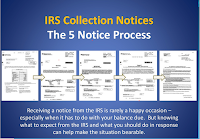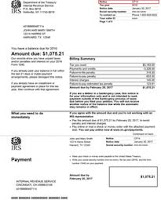On June 22, 2020 National Taxpayer Advocate Erin Collins issued a blog
post advising readers to keep an eye out for notices with expired action dates. As the country continues to grapple with the COVID-19 emergency, IRS campuses are reopening and employees have begun processing the work backlog, including notices.
On June 22, 2020 National Taxpayer Advocate Erin Collins issued a blog
post advising readers to keep an eye out for notices with expired action dates. As the country continues to grapple with the COVID-19 emergency, IRS campuses are reopening and employees have begun processing the work backlog, including notices.During the shutdown, the IRS generated more than 20 million notices; however, these notices were not mailed. As a result, the notices bear dates that now have passed, some by several months, and some of the notices require taxpayers to respond by deadlines that also have passed. There is a silver lining, however. The IRS is providing additional time to respond before interest or penalties apply.
There are several dozen kinds of IRS notices ready to be mailed in the next month or two. As the mailing and response dates have passed, the IRS is establishing new response dates.
For Business Reasons, The IRS Is Not Revising
The Generated Notices.
Rather, It Is Enclosing An “Insert” In Its Mailings,
Which Consists Of An Additional Page At The End of
The Notice That Provides Updated Due-Date Information.
Initial Balance Due Notices (sometimes called a Notice and Demand)
The IRS has begun mailing the backlog of 1.5 million notices informing taxpayers that their tax hasbeen assessed and they have a balance due. The law requires the IRS to send these notices within 60 days of making an assessment. Taxpayers should look for the insert included at the end, Notice 1052-A, entitled “Important! You have More Time to make Your Payment.” It specifies that:
- For returns due on or after April 1, 2020, and before July 15, 2020, taxpayers have until July 15, 2020, to make a payment before interest or penalties apply.
- For income tax returns due before April 1, 2020, or employment or excise returns due on or after April 1, 2020, taxpayers have until July 10, 2020, to make a payment before interest or penalties apply.
Notice 1052-A provides a link to the IRS.gov webpage on coronavirus relief, which provides further details about the relief for filing and payment deadlines.
Math Error Notices Increasing the Amount of Tax
A subset of the notice and demand backlog is math error notices, which include critical deadlines. When the IRS proposes an increase in tax for a simple mathematical or clerical error, the law provides the taxpayer with 60 days to request a reversal of the math error adjustment. If the taxpayer does not timely request a reversal, the tax is assessed and the taxpayer loses the opportunity to appeal the liability in U.S. Tax Court, which is the taxpayer’s only opportunity to challenge the liability in court prior to paying it. TAS worked with the IRS to create a special insert for these notices to ensure taxpayers know what they need to do to protect this fundamental taxpayer right.
- The backlog of math error notices will include Notice 1052-B, Important! You Have More Time to Make Your Payment, which provides taxpayers with 60 days after the notice is sent to contact the IRS to request a reversal.
Collection Due Process and Other Backlog Notices
For other notices in the backlog that provide a deadline for action, TAS is working with the IRS to develop insert language that will clarify the new deadlines. For Collection Due Process (CDP) notices, TAS has recommended the IRS provide a revised deadline to request a CDP hearing that is 30 days after the IRS mails out its backlog CDP notices – and include an insert to that effect. This approach will help ensure that the taxpayer’s right to request an appeal in an independent forum is not compromised during the coronavirus emergency.
Even with these efforts, there will likely be taxpayers who contact the IRS because they are confused about when they must respond. In addition to reading the insert, taxpayers and practitioners should check the IRS’s website and look for updates via alternative channels, such as social media and other outreach. Compounding the confusion surrounding notice dates, IRS transcripts for taxpayers’ accounts will also reflect incorrect dates for some of the notices. TAS is continuing to work with the IRS to provide guidance to its employees about how to help taxpayers understand their notices and account transcripts.
Marini & Associates, P.A.
www.TaxAid.com or www.OVDPLaw.com
or Toll Free at 888 8TAXAID (888-882-9243)
Read more at: Tax Times blog










